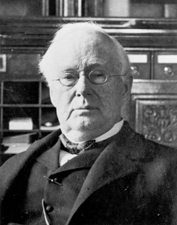George Frisbie Hoar
|
|
George Frisbie Hoar (29 August, 1826–30 September, 1904) was a prominent United States politician.
Hoar was born in Concord, Massachusetts. Through his mother he was a grandson of Roger Sherman, a signer of the United States Declaration of Independence. His father, Samuel Hoar, was a prominent lawyer who served on the Massachusetts state senate and the United States House of Representatives. (His brother Ebenezer R. Hoar was one of Ulysses S. Grant's Attorneys General.)
He graduated from Harvard University in 1846, then studied law at Harvard Law School and settled in Worcester, Massachusetts where he practiced law before entering politics.
He initially was a member of the Free Soil Party, then joined the Republican Party shortly after its founding. He was elected to the Massachusetts House of Representatives in 1852, and the State Senate in 1857.
In 1865 Hoar was one of the founders of the Worcester County Free Institute of Industrial Science, now the Worcester Polytechnic Institute.
Hoar represented Massachusetts as a member of the U.S. House of Representatives from 1869 through 1877; he then served in the U.S. Senate until his death. He was a Republican who generally avoided party partisanship and did not hesitate to cricize other members of his party whose actions or policies he believed in error.
He was long noted as a fighter against political corruption, and campaigned for the rights of African Americans and Native Americans. He argued in the Senate in favor of Women's suffrage as early as 1886.
He was part of the Congressional Electoral Commission involved with settling the highly disputed U.S. presidential election, 1876. He authored the Presidential Succession Act of 1886 (see: United States presidential line of succession).
He was chair of the Republican Party's national convention in 1888.
With the Spanish American War Hoar became one of the Senate's most outspoken opponents of the Imperialism of the William McKinley administration. He denounced the Philippine American War, calling for allowing independence of the Philippines. He also denounced the US intervention in Panama.
In addition to his political career, he was active in the American Historical Society and the American Antiquarian Society, serving terms as president of both organizations. He was a regent of the Smithsonian Institution in 1880, and a trustee of the Peabody Museum.
George Frisbie Hoar's autobiography, Autobiography of Seventy Years was published in 1903; it first appeared in serial form in Scribner's magazine.
He enjoyed good health until June of 1904. He died in Worcester, and was buried in Sleepy Hollow Cemetery, Concord. After his death a statue of Hoar was erected in front of Worcester's city hall, paid for by public donations.

